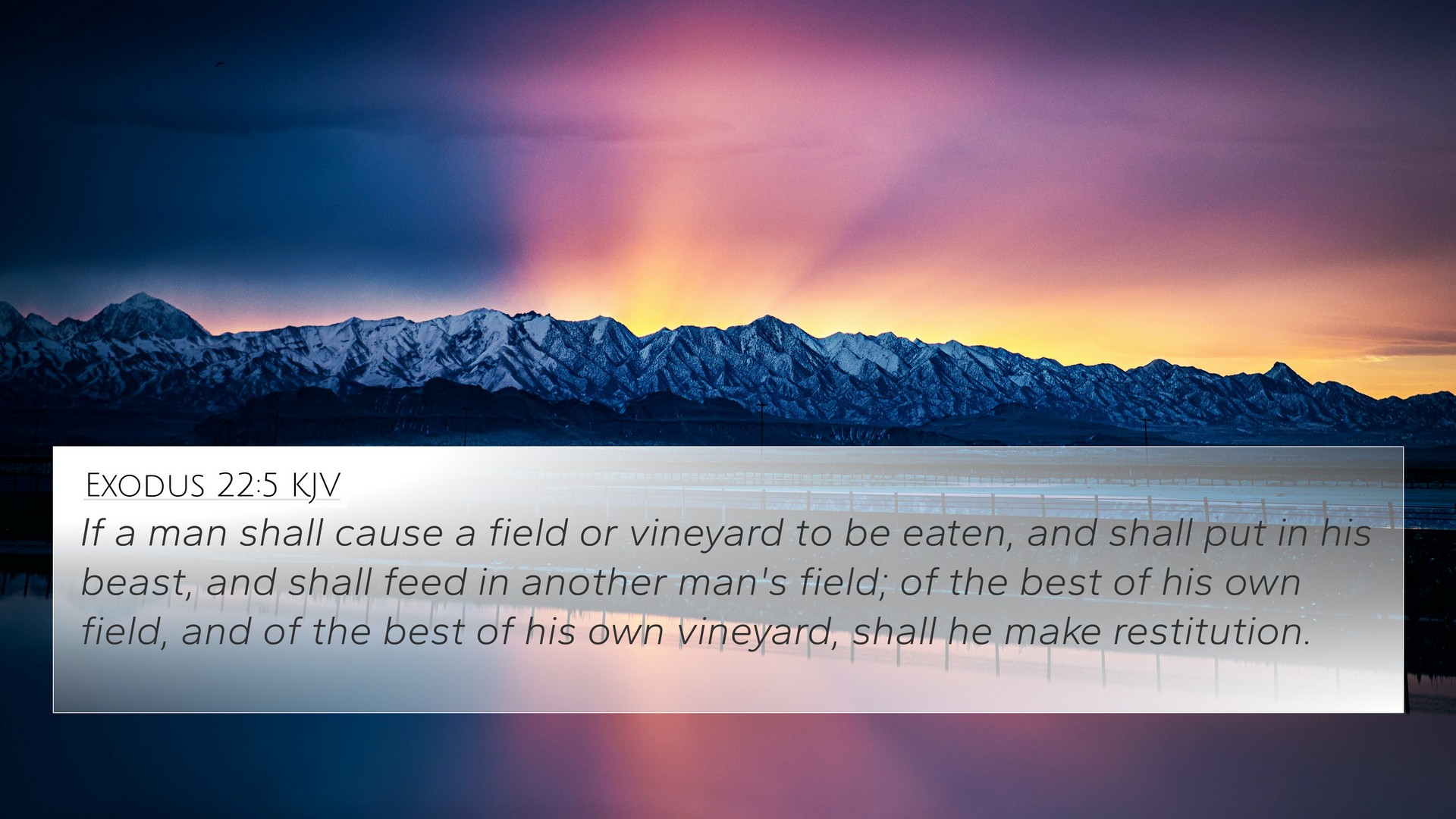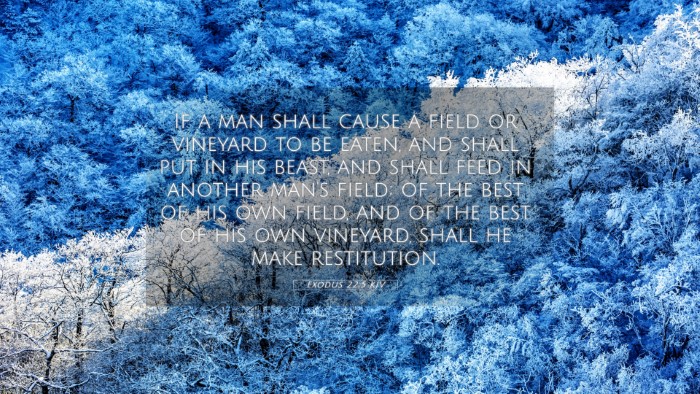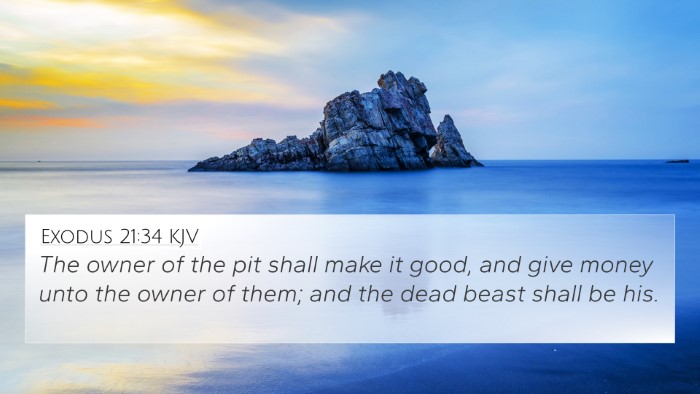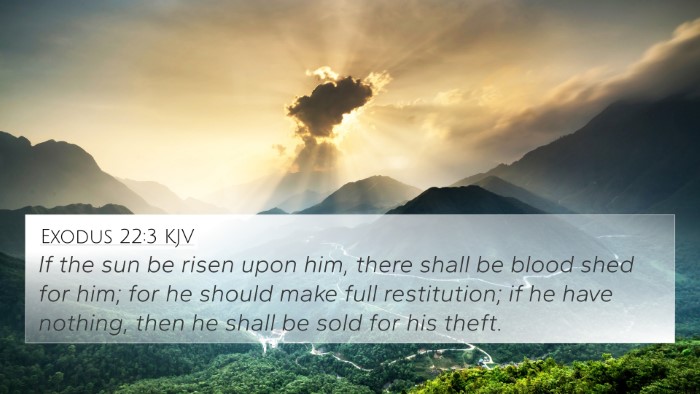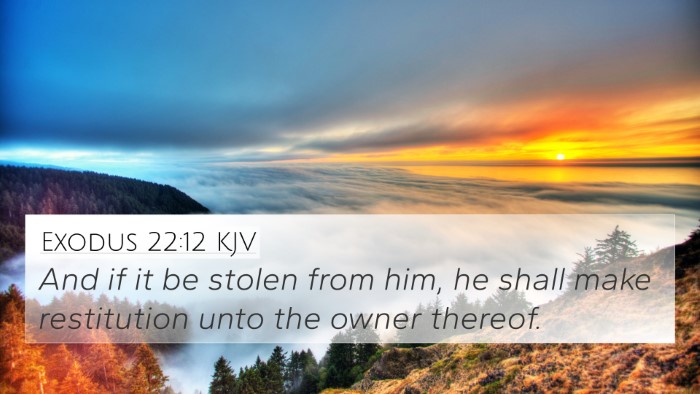Understanding Exodus 22:5
Exodus 22:5 states: "If a man causes a field or vineyard to be grazed bare, and lets his beast loose, and it grazes in another man’s field; he shall make restitution from the best of his own field and from the best of his own vineyard." This verse highlights the principles of responsibility, restitution, and fairness in communal living.
Summary of Key Themes
- Responsibility: Individuals must take responsibility for the actions of their animals and ensure they do not cause harm to others.
- Restitution: The verse emphasizes the need for restitution when one’s actions lead to the loss or damage of another’s property.
- Community Ethics: Reflects the importance of ethical behavior in the context of community relationships.
Commentary Insights
This verse has been explored in various commentaries providing insights into its meaning and implications:
- Matthew Henry: Henry emphasizes that this law shows the necessity for care in one's dealings within the community. Ignorance of one’s animal's actions does not absolve one from the obligation to restore what was lost.
- Albert Barnes: Barnes comments on the principle of equity involved in this law. He discusses how it teaches accountability and justice as essential virtues in a society.
- Adam Clarke: Clarke argues that the verse underlines the relationships between neighbors, advocating for proactive measures to prevent loss and calling for fairness in restitution where loss has occurred.
Bible Cross-References
Exodus 22:5 is connected to several other Biblical texts that reinforce its themes of responsibility and restitution. Consider the following cross-references:
- Exodus 21:37: "If a man steals an ox or a sheep, and kills it or sells it, he shall restore five oxen for an ox, and four sheep for a sheep." This verse reinforces the idea of restitution for loss caused by one's actions.
- Deuteronomy 22:1-3: "You shall not see your brother's ox or his sheep going astray, and ignore them; you shall take them back to your brother." This emphasizes accountability towards one's neighbor regarding lost property.
- Leviticus 6:4-5: "Then it shall be, because he has sinned and is guilty, that he shall restore what he took by robbery, or what he got by extortion, or of that which was delivered to him to keep." This reinforces the principle of making things right when wrongful actions occur.
- Proverbs 3:27: "Do not withhold good from those to whom it is due, when it is in your power to act." This verse promotes the idea of acting justly and fairly towards others.
- Luke 19:8: "And Zacchaeus stood and said to the Lord, 'Behold, Lord, the half of my goods I give to the poor, and if I have defrauded anyone of anything, I restore it fourfold.'" This New Testament passage illustrates the enduring principle of restitution.
- Matthew 5:23-24: "So if you are offering your gift at the altar and there remember that your brother has something against you, leave your gift there before the altar and go. First be reconciled to your brother, and then come and offer your gift." This emphasizes reconciliation and responsibility.
- Romans 13:7: "Pay to all what is owed to them... respect to whom respect is owed, honor to whom honor is owed." This confirms the importance of fulfilling obligations and duties to others.
Tools for Understanding and Cross-Referencing
For those engaged in deeper Bible study, utilizing tools and methods for cross-referencing can enhance understanding of texts like Exodus 22:5:
- Bible Concordance: This tool assists users in finding where themes or specific terms are referenced throughout the Bible.
- Bible Cross-Reference Guide: A guide can help in locating verses that relate to specific topics or ideas within Scripture.
- Cross-reference Bible Study: Engaging in cross-referencing not only deepens knowledge but also reveals interconnectedness in God's word.
- Comprehensive Bible Cross-Reference Materials: These materials provide extensive lists of related scriptures, fostering further study and understanding.
Conclusion
In summary, Exodus 22:5 not only sets a framework for communal ethics regarding property and restitution but is also deeply interwoven with various themes and teachings found throughout Scripture. Understanding this verse through the lens of cross-referencing can provide illuminating insights and practical applications for modern believers, reinforcing that the principles of justice, accountability, and community greatly resonate in the Bible.
Further Study Suggestions
To understand Exodus 22:5 more deeply, consider:
- Engaging in a comparative Bible verse analysis by researching related laws and teachings in both the Old and New Testaments.
- Utilizing tools such as a Bible concordance to find additional verses that address similar themes.
- Looking into topical studies focusing on justice and restitution across scripture.
- Exploring commentaries and viewing different interpretations of the verse.
